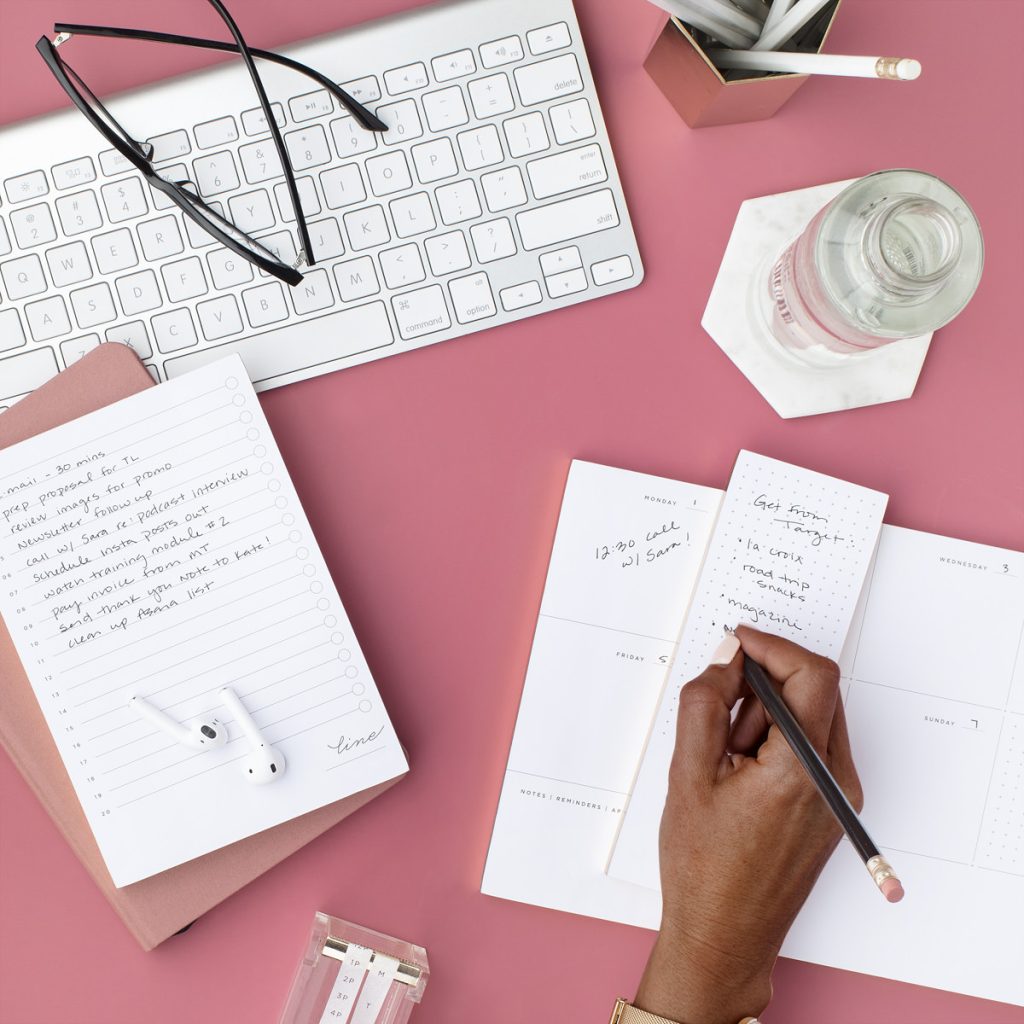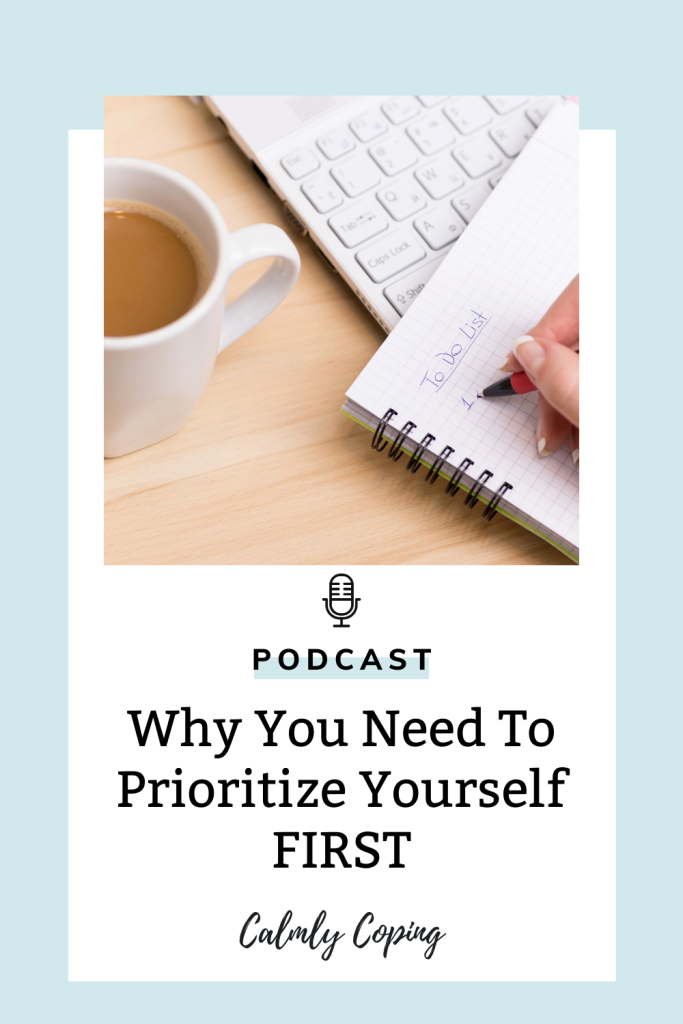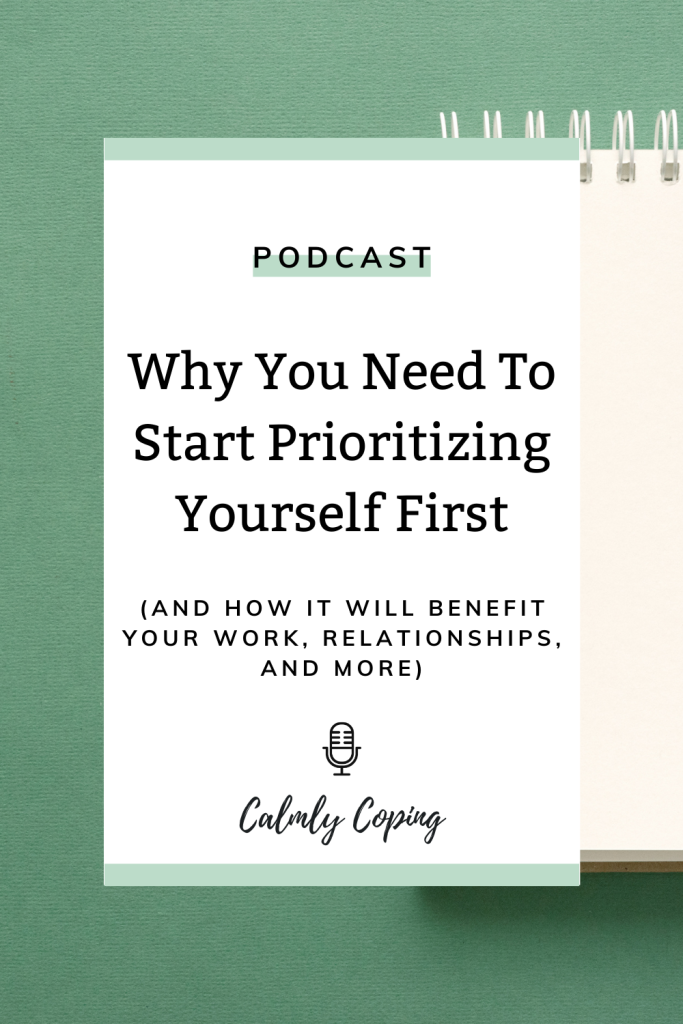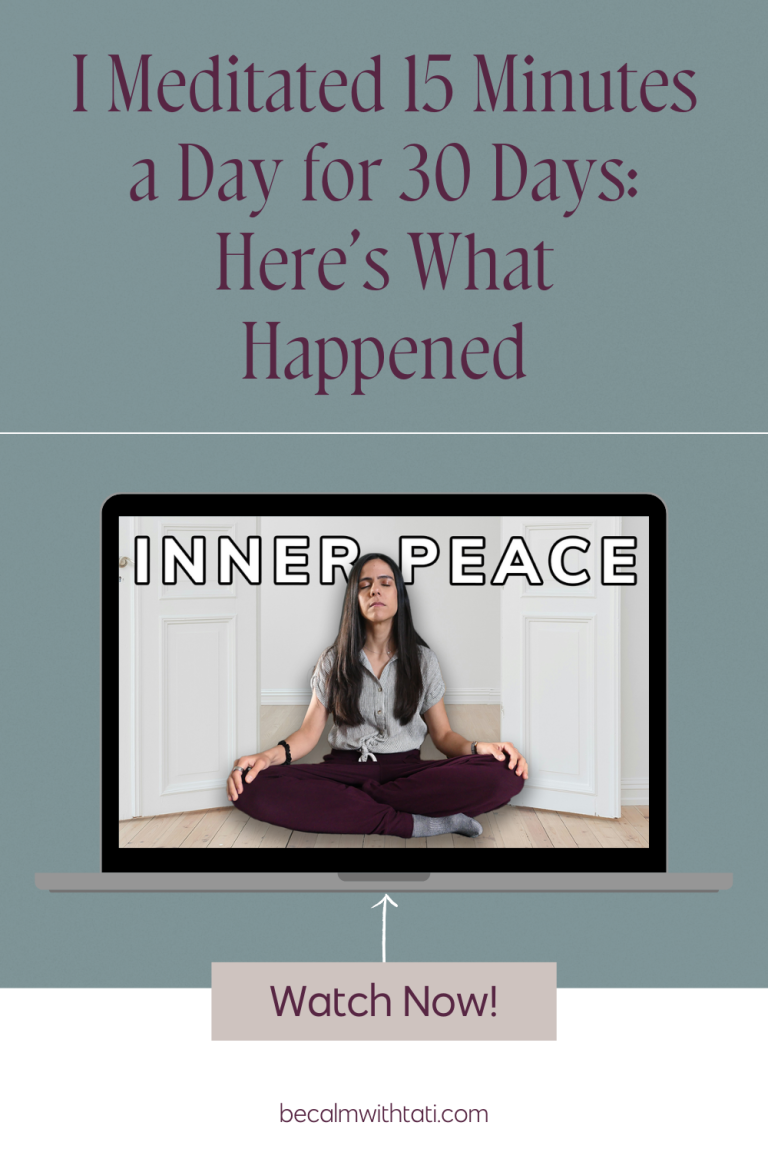Listen Now:
*Note: this is a podcast transcription so there may be errors in grammar.
It’s not selfish to prioritize yourself first. It’s an act of self-love and communicating through your words and your actions that you matter, you are important and you are worthy of having your needs addressed. I’m going to be talking all about why you need to prioritize yourself first, along with how to get past the blocks that might come up when you start to think about prioritizing yourself and your needs.
When You Struggle With High-Functioning Anxiety, It’s Easy To Put Your Needs Last
When you struggle with high functioning, anxiety or anxiety in general, it’s so easy to put your needs last. Your mindset can be so driven by fear of the, what ifs that you’re more in survival mode than in the space of recognizing your needs.
And here’s the problem with that: it becomes an endless cycle, the less you’re taking care of yourself, the more anxious and overwhelmed you’re going to feel. And here’s why…
1. Your Energy Needs To Be Recharged
Reason number one is because of an energy management and your mental wellness. So these are both finite resources. When you’re not recharging or managing your energy or taking the time and space to care for your mental health and your emotional wellness, then you absolutely will become depleted and have nothing left to give.
So that’s why it’s so important to prioritize yourself so that you’re able to refill those energy sources and care for your mental health and wellness, because just like caring for your physical health, through exercising or eating well, taking care of your mental and emotional wellness is a regular thing. It’s something that you need to do on a regular basis in order to ensure that you’re caring for your needs.
2. Modeling
Here’s another reason why it’s important to prioritize yourself first. So it’s all about modeling and this is when you are showing others how to do things. So that’s essentially the definition of a modeling.
It’s like, let’s say if you’re teaching somebody how to drive a car, you’re going to get in the car and drive it and show them how you do it. That’s modeling. So prioritizing yourself is a great way of modeling yourself worth to those around you. So this is especially true for children, but also friends, family, significant others.
And they’ll treat you accordingly according to how you were modeling that for others. So you’re teaching your children for example, how to prioritize and care for themselves. But you’re also teaching them how to treat you because you’re demonstrating that you’re worthy of having your needs taken care of.
3. Anxiety Increases When You Ignore Your Needs
Here’s another reason why it’s important to prioritize yourself. So anxiety can come about when you’re focusing more on other people’s needs and wishes than your own. So this happens when you get stuck in that place of people pleasing and feeling like I need to do what’s better for others before myself.
And you might feel this internal tension because you’re not respecting your own wishes, further deepening those feelings of dread, worry and unease. So this is when there is that discrepancy between what you feel like you should do versus what you actually want to do. And this is not saying that you should be disrespecting the needs of others or ignoring the needs of others.
But it’s when you’re faced with situations where you’re doing things solely from a place of guilt or from a place of I’m going to do this, because I don’t want this person to be mad at me or because I want them to like me. These are coming from different places and hopefully you’re able to understand that.
So that difference between am I doing things because I want to, and because I, you know, it’s important for me to care for my children or my significant other, or my family member friends, or is it that, you know, there’s this real discrepancy between like, I really don’t want to do this, but I’m afraid what’s going to happen if I don’t.
4. Nobody Else Will Do It For You
Another reason why it’s important to prioritize yourself is that nobody else is going to do it for you only, you know what you need, and you may not know exactly what that is right now and in every moment. And that’s okay. It’s a journey and a process of listening to yourself and respecting yourself.

Common Blocks and Resistance To Prioritizing Yourself First
So here’s some common blocks or resistance that may come up when you start to think about prioritizing yourself first.
1. Prioritizing Yourself First Is Selfish
This is something that I often hear from clients and from students. As long as you’re being respectful and not dismissing the needs of others, like I said previously, then it’s not selfish.
How is it selfish to take care of yourself? It’s not selfish because you deserve to be taken care of because you have this life here as a human, and you’re not here solely to serve others. And let’s say, hypothetically, if, if you felt like you were, you cannot serve and help others without caring for yourself first.
It’s just common knowledge and the metaphor that I like to use is if you’re flying in a plane and they always give you that safety training before the flight that states if the cabin pressure dips or oxygen levels fall on the plane, then a face mask is going to fall from the ceiling with oxygen flowing through it.
And they tell you to always put your mask on first before helping others. Because the fact is, if you try to put the mask on others before putting it on yourself, then you could pass out before you’re able to help them. The same applies in life. You’re not going to have enough left in you if you’re caring for others before your own needs, and that’s not selfish. It’s just reality.
2. Feeling Guilty Prioritizing Yourself First
Another common block or resistance that people might feel that you might feel when it comes to prioritizing yourself first are those feelings of guilt that come up. The guilt regarding prioritizing yourself. You might feel guilty that for example, as a parent it’s not right for me to focus on myself.
Like I should be caring for my kids first, or it let’s say if you’re at work, then you might feel guilt. That I have to focus on my job. This is what I’m here for. I have to put time and effort into my relationship or my clients. So you might feel guilty, let’s say taking breaks or taking time for yourself or wanting to be by yourself and.
This is common, and this can be especially common if you’ve been raised to focus on others first. So maybe you saw this behavior in your parents or in your grandparents, that they were constantly giving and caring for others and not focusing on their own needs. And, you know, it’s important to recognize this and to see, you know, is this something that you’ve learned because it’s been, you know, occurred through your family generationally or is it, you know, societal pressure that makes you feel as guilt that you’re comparing yourself to other professionals online or other parents and seeing what they’re doing and then doubting yourself.

Is The Guilt Helping You?
It’s important to recognize this guilt and realize that you’re feeling this guilt because you care. So you’re feeling this guilt because, because you want to be a good worker or you want to be a good parent, but this guilt isn’t serving you. I think a good way to look at guilt is to question how is this guilt helping me?
Is it helping me be a better parent to feel guilty? Is it helping me be a better worker to feel guilty? Am I trying to punish myself because I feel like I shouldn’t be taking care of myself first? What purpose does this guilt serve? If any. And, you know, I think in, in questioning that, then you may find that this guilt isn’t helping you, it’s not helping the people around you or the people that you help.
It’s only hurting you and it’s only making you feel worse. It’s important to recognize that you feel this guilt because you want to do well. And because you want to care for and help others, but it’s no longer serving you. Recognize that whether it’s parent guilt or work guilt or whatever might be coming up, it’s possible to let go of this guilt.
It’s not going to have a negative impact on who you are as a person or on how other people view you.
3. How Can I Care For Others If I Am Prioritizing Myself First?
So other common blocks and resistance that might come up are this question of like, well, how can I care for others? If I’m always focusing on myself, And so this is a false dichotomy. This idea that you can only focus on others or only focus on yourself that it’s all or nothing either, or, and that our minds do this to simplify things and oversimplify things.
But the reality is these things aren’t mutually exclusive. You can care for yourself and care for others. And in fact, caring for yourself allows you to care for others in a better way when you’re prioritizing yourself first. Let’s just say, hypothetically, you might feel happier, more fulfilled. And as a result, this is going to reflect in the way that you treat others.
So you’re going to be maybe more attentive to their needs because you’re feeling less resentful.
4. I Don’t Have Enough Time To Prioritize Myself
Another common block or resistance that might come up is feeling like, “I don’t have time. I just don’t have time to take care of myself. I work a full-time job. I’m a full-time parent,” or whatever it is that your responsibilities are, you feel like, “I just do not have time to take care of myself.”
And to that, I challenge you with this: what is the cost of not taking care of yourself? And is it not true that you prioritize other people, you prioritize other people in your schedule, you prioritize taking care of your family members or children, and that’s because you see those things as being important.
So is it that you don’t have time or is it that you’re unwilling or unable to make the time? I think this objection of I don’t have enough time is often that you feel like you can’t justify making the time for something. It all comes down to how important is this to you? How important is it for you to be a better employee and be more present in your life or to be a better parent or a better partner?
Once you can recognize the importance of making these changes and the importance of prioritizing yourself. Then all you need is, you know, 10 minutes a day to do a meditation or go for a walk around the block or do something that is going to be spending that time for you. And then over time, you can start to increase that time that you’re spending for yourself, but just start off in small increments and see if that makes a difference.
Practical Tips To Start Prioritizing Yourself
So now here are my practical tips for how to start prioritizing yourself. First, I have a few questions to ask you. So I want you to reflect on the decisions you make every day. Are you continuing to make decisions that don’t serve you? Just because they’re the same decisions that you’ve been making every day, do you say yes to others before yourself?
And do you check in with yourself and truly ask yourself, what is it that I need? What are my body and mind telling me in this moment? So, those are just a few reflection questions. And now I have some practical tips for you.
1. Set aside 5-10 minutes daily to check-in with yourself
So, like I said previously, set aside just five to 10 minutes daily to meditate journal, or just check your internal weather pattern. Try doing it right now.
Just take a few seconds and check in with yourself and assess, how am I feeling right now? Am I holding onto tension in any areas of my body? Am I feeling overwhelmed? Are my thoughts all over the place? What’s going on for you personally? And even if you set, let’s say an alarm on your phone where you just want to check in with yourself daily or download an app like Daylio that gives you that opportunity to check in with your mood and emotions daily. I think this can be a great practice to engage in.
2. Schedule self-care time in your calendar
Tip number two to prioritize yourself first is to schedule self-care time in your calendar. So it’s so easy to schedule meetings and plans with others, but when it comes to yourself, it’s harder.
So I’ve spoken to clients who have told me that it’s so hard to say no to plans, even though they had wanted to take the day or evenings for themselves, because they feel like it’s not a good enough reason. Why isn’t it good enough? Your plans with yourself are just as important as your plans with others.
And when you make excuses or you cancel them, then your non-verbally communicating the message to yourself that my self-care isn’t important. So I’ll just keep putting it off and do it later. And this is not the message that you want to communicate, because this is going to result in resentment, overwhelm, burnout, anxiety, and frustration.
So one practical thing you can do is to schedule self care time in your calendar. So maybe it is one weekend a month that you take for self care. Maybe it’s one day a month or one evening, or maybe it’s more regular, maybe it’s one evening a week. Or maybe it’s 30 minutes a day, whatever it is that works for you start small and see if you notice a difference.

3. Journal about the guilt and resistance regarding prioritizing yourself
I talked about guilt before. Another practical thing that you can do is to journal about the guilt and resistance that might come up to prioritizing yourself first. What are the excuses and objections that your mind brings up? I want you to write those excuses down and really question them and assess how accurate these thoughts are.
Example: I feel guilty taking time for myself in the morning because I should be starting my work first.
Question the thought: Why is your work more important than taking time for yourself?
Answer: Because I have a deadline coming up that is important.
Question: Won’t taking time for yourself help you feel in a better mood and more focused at work?
Answer: Yes, that’s probably true. I’m just scared that I won’t feel motivated to start work.
Question: What if you set an alarm to start work at a specific time?
Answer: Okay, I will set an alarm after spending 20-30 minutes for myself in the morning.
Rewritten thought: I deserve to take time for myself in the morning because it will help me feel in a better mood and more focused at work, so I can get my project done on time.
So that’s just one example of how you can journal about and challenge that guilt and resistance that comes up for you.
4. Schedule an appointment with a therapist or a coach
And my last practical tip would be to schedule an appointment with a therapist or a coach. So seeking out support for yourself is prioritizing yourself and it’s okay to need help on that journey. It can be so hard to ask for help, but it is so courageous and can be so rewarding and can allow you to make progress in a much quicker time than you might on your own.
And it can also help to have that external perspective to allow you to see things that you may not notice in yourself. If you’re ready to take the journey. When it comes to high functioning anxiety coaching, then you can click here to learn more about my VIP program. So your action tip for this episode is to take at least one of my tips and implement it starting today.
It will only take about five to 10 minutes and it isn’t about doing it today and then stopping. But prioritizing yourself first and any act of self-improvement and growth comes about as a result of the small steps that you take every single day. And it is a cumulative effect, not a short-term one. So I’d love you to put this into action and let me know how it helps in the comments below.















